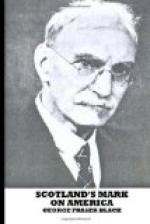WYOMING. Thomas Moonlight (1833-99), sixth territorial Governor (1887-90), was born in Forfarshire.
UTAH. Eli Houston Murray (b. 1841), Governor (1880-84), of Scottish ancestry.
IDAHO. John Henry Brady (b. 1862), eighth Governor (1910-11), is of Ulster Scot descent. David P. Thompson, ninth Governor of the state (1874-76), also of Ulster Scot descent, built the first railroad in Oregon, and was twice Mayor of Portland.
SOUTH DAKOTA. Corie Isaac Crawford, sixth Governor (1907-08) is of Ulster Scot descent.
CALIFORNIA. John McDougall (1818-66) was Lieutenant-Governor (1849) and afterwards Governor. Peter Hardeman Burnett (b. 1807) was first Governor of the state (1849-51). Both were of Scottish origin.
OREGON. James Shields, first territorial Governor (1848), was born in Dungannon, County Tyrone, of Ulster Scot parentage. George Abernethy (1807-77), territorial Governor (1845-49), was born in New York city of Scottish parentage. “As a governor he was patriotic, efficient, and unselfish.”
SCOTS IN THE ARMY
REVOLUTION. Alexander MacDougall (1731-86), born in Islay, successively Colonel, Brigadier-General, and Major-General in the Revolutionary War, and later Delegate to the Continental Congress in 1780 and 1784, was described by Washington as “a brave soldier and distinguished patriot.” Before the outbreak of the war he was a successful merchant, a leader of the “Sons of Liberty,” and was the first American imprisoned for his utterances in behalf of independence. Macdougal Street, New York city, commemorates his name. Robert Erskine (1735-1780), geographer and Chief of Engineers on the staff of Washington, was a son of Rev. Ralph Erskine of Dunfermline. Washington erected a stone over his grave at Ringwood, New Jersey. Henry Knox (1750-1806), General of Artillery and Secretary of War (1785-95). Lieutenant-Colonel Richard Clough Anderson (1750-1826) was grandson of a Scottish emigrant. General James Ewing (c. 1736-1806), of Ulster Scot descent, served in Braddock’s campaign and also during the Revolution. General William Wirt Henry was descended from an Ulster Scot who came between 1718 and 1722 to Massachusetts. General Richard Montgomery (1736-75), a descendant of the Montgomeries of Ayrshire, was killed while leading the attack on Quebec; and Major John Macpherson (1754-75), of Scots parentage, killed beside Montgomery, was the first soldier of prominence from Pennsylvania to be killed in the war. Bancroft calls him “the pure-minded, youthful enthusiast for liberty.” Colonel Allan McLane (1746-1829), of Scottish origin, repeatedly referred to in Dr. Weir Mitchell’s “Hugh Wynne,” was one of the “Rough Riders” who patrolled the country around Philadelphia to prevent provisions reaching the British troops in the city. His flight and escape from the British in one of these raids was the subject of a painting




